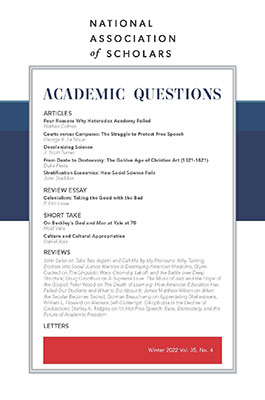Noël Valis is Professor of Spanish Literature at Yale University; [email protected]. Her latest book is Lorca After Life (Yale University Press, 2022). These remarks, slightly revised, were first delivered at the 11th Annual Conference of the William F. Buckley, Jr. Program at Yale, on the 70th Anniversary of God and Man at Yale, December 9, 2021.
I don’t remember when I first read this book, but I can say that I was no longer young. So I cannot claim that it had an influence on me in the way such things leave a lasting impression on us when we are young. Buckley’s persona was certainly familiar to me, as an undergraduate at Douglass College, the women’s college of Rutgers University, in the 1960s, not only because of his PBS program, Firing Line, but because of ISI, the Intercollegiate Studies Institute. Buckley was ISI’s first President in 1953, when it was known as the Intercollegiate Society of Individualists. ISI introduced me to the traditions of classical liberalism and the soaring achievements of Western civilization. Unaware of how new an organization it still was, in 1964, I came to ISI as an earnestly naïve Ayn Randian, swept away by The Fountainhead in high school and determined to be, if not Gary Cooper in the film version, at the very least, Patricia Neal.
This of course is what eighteen-year-olds, terrified of their own confusion, do: they latch onto something that promises clear, uncompromising answers and seems to provide a roadmap fully charted with no deviations, no change of plans permitted. It takes a while to sink in that life is not a roadmap. Ayn Rand’s philosophy was tremendously appealing to a young person from the backwater edges of the New Jersey Pine Barrens, but also tremendously limited, as I was to discover, with no small help from Buckley’s ISI. Since the 1960s, American society has seen wave upon wave of such certainties disguised as truths. Randianism was only one of them. It is a paradox that some of the most unsettling and even violent manifestations of those certainties have been premised on pre-packaged notions, admitting of no surprises along the way. And, I might add, no joy whatsoever taken in the improvisational gift of the universe.
Such dismal desire for certainty, for absolutes, afflicts us today. One has only to think of the fatal attraction to identity politics, which imprisons everyone in an infinitely expanding list of categories. Or the unforgiving (mis)understanding of those historical events and figures recognized as having benefited human pursuit, but who are expected to meet puritanical standards of inhuman perfection (see: toppled and defaced statues of Abraham Lincoln, Thomas Jefferson, Teddy Roosevelt, and even Miguel de Cervantes!). Or a social justice that is blind to its own biases. It never fails to astonish me that the practitioners of cookie cutter ideas are convinced they have revolutionized the world in a second coming, but such is the nature of conformism that it only flourishes when the non-categorized and the humanly flawed are flogged into submission.
Buckley’s book was published in an era seen as largely conformist. In 1956, five years after the appearance of God and Man at Yale, Jack Finney’s science-fiction novel, The Body Snatchers, was turned into a popular film under the title, Invasion of the Body Snatchers, in which seed pods replace people with their exact physical duplicates as they sleep, except they lack all emotion, inner distinctiveness, and will. They are outwardly diverse, but inwardly identical to each other. Clearly, current diversity, equity, and inclusiveness programs have much to learn from the efficiencies of such enterprise.
Buckley, who accused Yale of having abandoned its mission, made the university uncomfortable, poking the embers of complacency. And this, it seems to me, is a good thing for both institutions and people, for we are easily persuaded that all is well when no one says otherwise. But God and Man at Yale is also a young man’s book, not the least for its irreverent stance. Buckley objected to the growing secular and collectivist influences he perceived in the teaching practices of Yale’s professoriate. He argued that professors should follow the value orthodoxies of the institution, observing that a laissez-faire academic freedom or a value-neutral education did not serve students well. While I do not agree that “the attitudes of the faculty ought to conform to the university’s,” or that many would espouse such an idea, unless one is hired with such an expectation at an institution with an explicit set of values, he has a point that a liberal arts education is rarely values-neutral. To prove that point, he named names, adducing multiple examples of professors in different departments whose distinct views were taught in the classroom. I have said this was a young man’s book, because it seems to me that Buckley, too, wanted certainties, because it is natural to want them, having rejected, as he said, the notion of “the absolute that there are no absolutes.” But I do not find it reassuring when he says conformity to institutional values will not imperil free and open engagement with ideas. What happens when those values are antithetical to the free engagement of ideas?
And perhaps my unease is not surprising, given the turn of events over the last several years on campuses nearly everywhere, including Yale. For those events have far outstripped Buckley’s fears of individual, social, and spiritual diminishment. I am reminded that seven years ago, at the Fifth Annual Conference of the William F. Buckley, Jr., Program, I was moderating one of the panels when a group of Yale students threatened to shut it down—at a conference devoted to the defense of free speech in higher education! Shortly before this incident, other Yale students verbally bullied Professor Nicholas Christakis, in a shocking Red Guard display of intolerance and hostility to the civil exchange of ideas. And much more recently, the university dismissed the concerns of alumni with respect to the elimination of the alumni fellow petition process for a seat in the Yale Corporation. Alumni participation in the governance of Yale University was an obligation, in Buckley’s view. All these examples suggest a troubling erosion of democratic principles. And a very good reason to revisit this passionately argued book, whether one agrees or not with all his premises, in an era like ours, when the threat of conformity has never been greater.
Photo by Los Angeles Daily News - https://digital.library.ucla.edu/catalog/ark:/21198/zz0002pzfc, CC BY 4.0, https://commons.wikimedia.org/w/index.php?curid=75480567













